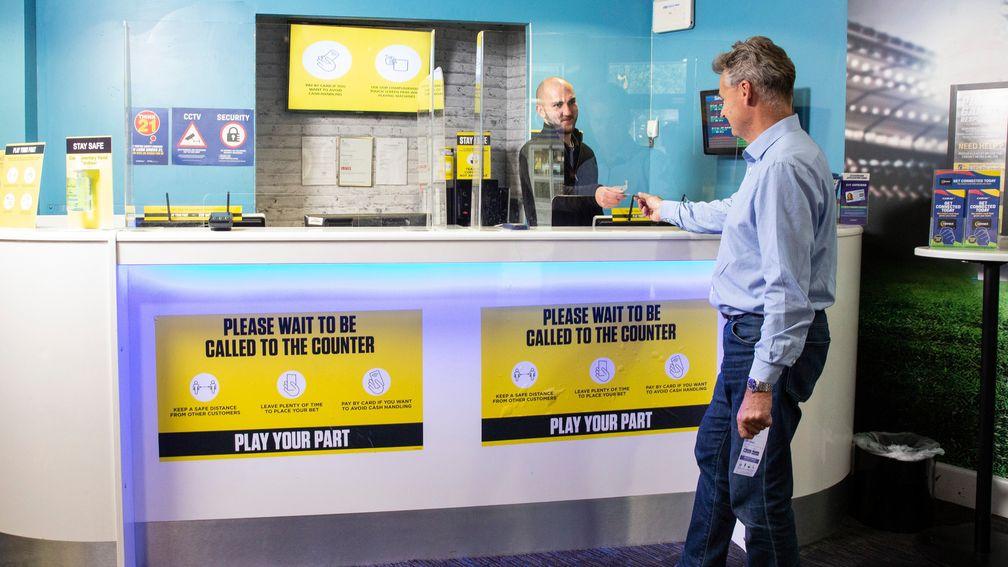Government says bookies closure due to customers staying for 'sustained period'

The sedentary nature of betting shop patrons has been put forward as a reason for the closure of the businesses under the Tier 3 very high alert level Covid-19 restrictions in England.
From Friday, Nottinghamshire will become the latest area to enter the highest alert level, following the Liverpool City region, Greater Manchester, Lancashire, South Yorkshire and Warrington in an attempt to slow the increasing rates of coronavirus infections.
In all areas betting shops have been ordered to shut by local officials despite not being part of the baseline restrictions required by government as part of Tier 3 measures, while other high street businesses have remained open under Covid-safe guidelines.
The closure of 1,250 betting shops in England – plus a further 366 in Wales until November 9 – under the rules has angered those within the gambling sector, with Michael Dugher, chief executive of the Betting & Gaming Council, arguing the move was "not remotely about science", a stance backed up by Betfred founder Fred Done.

However, the Department for Health & Social Care outlined that betting shop customers had an increased likelihood of remaining in an enclosed space for a prolonged period, raising the chances of them potentially contracting the virus.
A government spokesperson said: "Our regional approach is designed to reduce transmission whilst minimising the wider impact on the economy.
"The closure of betting shops in some areas has been jointly agreed with local leaders as we know the virus thrives in enclosed spaces where people can remain for a sustained period."
Infection rates of Covid-19 continue to increase across England, according to figures compiled by Imperial College London and Ipsos MORI that were published by the government on Thursday.
Data collected from 85,000 volunteers between October 16-25 showed the virus was doubling every nine days in the general population with the R rate – the number of people infected by each person with the virus – up to 1.6.
Professor Paul Elliott, director of the programme at Imperial from the School of Public Health, said: "These interim findings paint a concerning picture of the situation in England, where we're seeing a nationwide increase in infection prevalence, which we know will lead to more hospitalisations and loss of life.
"We're also detecting early signs that areas which previously had low rates of infection are following trends observed in the country's worst-affected areas. Now more than ever we must all work together to curb further spread."
More betting shops will close at the beginning of next week after it was announced that West Yorkshire will also enter Tier 3 restrictions.
The whole of West Yorkshire, which includes Leeds, Bradford and Huddersfield, will enter the highest band of measures on Monday in a bid to curb the spread of Covid-19, after NHS figures showed the Yorkshire and the Humber region has the fastest-growing infection rates in England.
This story is exclusive to Members' Club Ultimate subscribers. Read more great members' content:
Survey warns 60 per cent of owners may downsize as ROA reveals Covid action plan
Racing's warning lights are flashing and actions must replace ambitions
Strategic thinking: why racing must start planning now to tempt back racegoers
Keeping summer tracks racing through the winter could prove a valuable lifeline
Football League vows to protect 'vital income stream' from gambling industry
Published on 29 October 2020inNews
Last updated 09:03, 30 October 2020
- 'It's a dream come true' - 18-year-old to follow in Khadijah Mellah's footsteps with ride in the Magnolia Cup
- Merci Olivier! No final winner for Olivier Peslier but the world of racing unites in saluting the end of a great career
- The latest edition of the Racing Post is available to read online now - here's how you can access it
- How Smart View recorded a 76 per cent profit at the Cheltenham Festival
- Smart View is available on the Racing Post app - how to read the revolutionary new racecard
- 'It's a dream come true' - 18-year-old to follow in Khadijah Mellah's footsteps with ride in the Magnolia Cup
- Merci Olivier! No final winner for Olivier Peslier but the world of racing unites in saluting the end of a great career
- The latest edition of the Racing Post is available to read online now - here's how you can access it
- How Smart View recorded a 76 per cent profit at the Cheltenham Festival
- Smart View is available on the Racing Post app - how to read the revolutionary new racecard